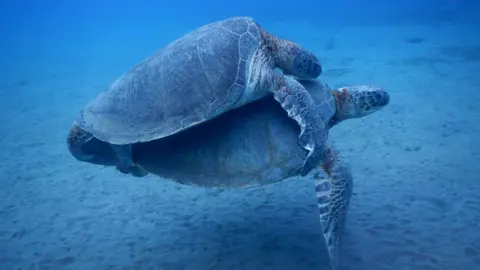Turtle experts call for cross-border conservation
 Jack Wiggins
Jack WigginsTurtle researchers in the South West have called for cross-border protection efforts, after a new study found females only spend about a fifth of their time in conservation zones.
Ecologists at Exeter University attached satellite tags to 10 nesting turtles in the Caribbean island of Montserrat, to see where they went after they laid their eggs.
The turtles, which usually nest multiple times a year, visited a range of places across the Caribbean, with some travelling more than 1,000km (621 miles).
Jack Wiggins, from the Centre for Ecology and Conservation on Exeter's Penryn Campus, said the study showed "conservation has to be done co-operatively, across international borders".
'Regionally important'
Turtles spent just over 20% of their time in Marine Protected Areas (MPAs) during migration and foraging, the researchers said.
Mr Wiggins said: "About 100 turtles – mostly green and some hawksbill – nest each year from June to November in Montserrat."
He said the numbers were "modest" but the populations were "regionally important".
The study showed turtles visited countries including the US Virgin Islands, Puerto Rico, the Dominican Republic and Guadeloupe.
'Multitude of threats'
Dr Nicola Weber, also from the University of Exeter, said sea turtles had a "varied level of protection" across the region.
Dr Webber said turtles faced "a multitude of threats, including legal and illegal fishing, habitat destruction and the impacts of climate change".
"Our study highlights the importance of Montserrat for sea turtles, and helps to identify focal points for protection in a changing climate," she said.
Montserrat has recently worked with researchers to create a Marine Turtle Action Plan to guide its conservation efforts.
Daniel Edwards, from Montserrat's government, said it highlighted "the vital role of our island as a nesting site for green and hawksbill turtles" and the "shared responsibility" Caribbean nations had to protect turtles.
"We remain committed to safeguarding critical habitats, fostering regional collaboration, and addressing the challenges posed by climate change and human activities to ensure the survival of these species for future generations," he said.
Follow BBC Cornwall on X, Facebook and Instagram. Follow BBC Devon on X, Facebook and Instagram. Send your story ideas to [email protected].
